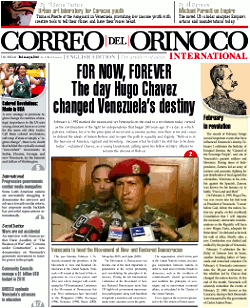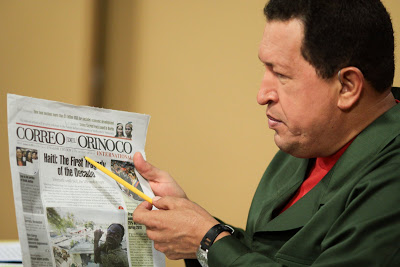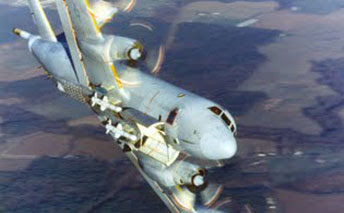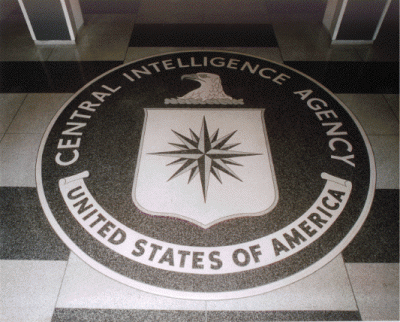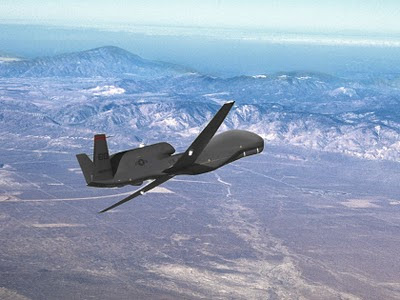IS THERE ANY MARGIN FOR HYPOCRISY AND DECEIT?
The United States, in its struggle against the Revolution, had in the Venezuelan government its best ally: the eximious Mr. Rómulo Betancourt Bello. We did not know it then. He had been elected President on December 7, 1958; he had not taken office yet when the Cuban Revolution triumphed on January 1st, 1959. Weeks later I had the privilege of being invited by the provisional government of Wolfgang Larrazábal to visit Bolivar’s homeland, which had been so supportive of Cuba.
Very seldom in my life had I seen a warmer people. The film images are still preserved. We drove down the broad highway that replaced the paved road I was taken through the first time I traveled to Venezuela in 1948 -from Maiquetía to Caracas- by the most reckless drivers I had ever seen.
That time I heard the noisiest, longest and most embarrassing booing of my life when I dared to mention the name of the recently elected President-to-be. The more radical masses of the heroic and combative Caracas had overwhelmingly voted against him.
The “illustrious” Rómulo Betancourt was referred to with interest by Latin America and Caribbean political circles.
What was the explanation for that? He had been so radical when he was young that at the age of 23 he became a full member of the Political Bureau of the Communist Party of Costa Rica and remained there from 1931 to 1935. Those were the hard times of the Third International. From Marxism-Leninism he learned about the class structure in a society, the exploitation of men by men throughout history and the development of colonization, capitalism and imperialism in recent centuries.
In 1941, together other leftist leaders, he founded the Partido Acción Democrática (Democratic Action Party) in Venezuela.
He acted as provisional president of Venezuela from October 1945 to February 1948 by virtue of a civic and military coup d’état. He went again into exile when the eminent Venezuelan writer and intellectual, Rómulo Gallegos, was elected Constitutional President and almost immediately after was ousted.
The well-lubricated machinery of his party elects him President during the elections held on December 7, 1958, after the Venezuelan revolutionary forces, led by Junta Patriótica (Patriotic Junta) that was headed by Fabricio Ojeda, overthrew the dictatorship of General Pérez Jiménez.
By the end of 1959, when I spoke at Plaza del Silencio, where hundreds of thousands of people had gathered, and I mentioned, out of sheer courtesy, the name of Betancourt, there was this colossal booing that I mentioned earlier against the President-elect. To me that was a true lesson of political realism. Later I had to pay a visit to him, since he was the President-elect of a friendly nation. I found him to be an embittered and resentful man. He was already the model of “democratic and representative” government the empire needed. He collaborated as much as he could with the Yankees previous to the mercenary invasion through Girón.
Fabricio Ojeda, a sincere and unforgettable friend of the Cuban Revolution, whom I had the privilege to meet and with whom I talked extensively, told me later much about the political process in his homeland and the Venezuela he dreamed of. He was one of the many persons assassinated by that regime, which was totally to the service of the imperialism.
Almost half a century has gone by ever since. I can attest to the exceptional cynicism of the empire that we, the Revolutionary Cubans, the proud heirs of Bolivar and Marti, have indefatigably confronted.
During all these years, ever since the days of Fabricio Ojeda, the world has changed significantly. The military and technological power of that empire has grown bigger, and so have its experience and total absence of ethics. Its media is ever more costly and less committed to moral standards.
To accuse Hugo Chávez, the leader of the Bolivarian Revolution, of inciting a war against the people of Colombia and unleash an arms race, to portray him as the mastermind and promoter of drug trafficking, and accuse him of repressing the freedom of expression, violating human rights and other similar misdeeds is a repugnant and cynical action, as everything else that the empire has done, still does and promotes. We can neither ever forget nor stop reiterating realities. Objective and well-reasoned truth is the most important weapon with which we should ceaselessly hammer into the conscience of peoples.
The US government -it is necessary to remind us of that- promoted and supported the fascist coup d’état in Venezuela on April 11, 2002, and after it failed, it pinned all its hopes in an oil coup, supported with technical programs and resources capable of destroying any government, thus underestimating the people and the revolutionary leadership of that country.
Ever since then, the US government has ceaselessly plotted against the Venezuelan revolutionary process, just as it did and has continued to do against the Revolution in our Homeland for fifty years now. The United States is far more interested in controlling Venezuela -given its huge energy resources and the other raw materials it has, which are obtained at negligible prices, as well as the huge facilities and services owned by transnationals - than Cuba.
After violently crushing the Revolution in Central America and thwarting, by bloody and repressive coups, the democratic and progressive advances in South America, the empire could not resign itself to the construction of socialism in Venezuela. This is a real fact that could not be denied by or hidden from those with a minimum political education in Latin America or elsewhere in the world.
It is worthwhile remembering that not even after the coup promoted by the United States on April 2002 the Venezuelan government armed itself. One oil barrel was hardly 20 dollars worth, a currency that was already devalued since 1971, when Nixon suspended the gold standard mechanism, almost thirty years before Chávez became President. When he took office, the Venezuelan oil was hardly 10 dollars worth. Afterwards, when prices went up, he invested the country’s resources in social programs, development and investment projects and cooperation with several Caribbean and Central American nations and other poorer economies in South America. No other country had offered such a generous cooperation.
He did not buy a single rifle during the first years of his government. He even did something that no other country would have done at a time when his integrity was at stake: he legally suspended the obligation of every honest and revolutionary citizen to defend their country with the arms in their hands.
I would rather say that the Bolivarian Republic waited for too long to acquire new weapons. The infantry rifles they had were the same that existed more than 50 years ago, when the head of the Provisional Government, Admiral Larrazábal, presented me with an automatic FAL rifle on November 1958, the penultimate month of the war. Venezuela continued to use that kind of infantry weaponry for several years after Chávez took office.
It was the US government the one that decreed the disarmament of Venezuela, when it banned the supplies of spare parts for all the Yankee military equipment which it had traditionally sold to that country, including fighting planes, military transport aircraft and even communication equipment and radars. Accusing Venezuela of engaging in an arms build-up is an extremely hypocritical attitude.
Quite on the contrary, the United States has supplied billions of dollars worth in arms, means of combat, aircraft and training to the Armed Forces of the neighboring Colombia. The pretext was the struggle against the guerrillas. I can bear witness to the efforts made by President Hugo Chávez in his quest for the internal peace in that sister nation. The Yankees not only supplied weapons; they also instilled feelings of hatred against Venezuela among the troops they trained, as they did in Honduras, through the Task Force based in Palmerola.
Wherever the US has military bases, it supplies the combat units with the same type of uniform and equipment used by the interventionist troops of that country anywhere else in the world. The United States does not need soldiers of its own, as in Iraq, Afghanistan or the northern region of Pakistan, to plot acts of genocide against our peoples.
The imperialist extreme right, which holds the reins of power, resorts to brazen lies to mask its plans.
The Venezuelan-American lawyer and analyst, Eva Golinger has shown how the strategic arguments used in the message sent on May, 2009, to the United States Congress to justify an investment in the military base of Palanquero were absolutely altered in the agreement whereby the United States received that same base together with several other civil and military facilities. The document sent to the Congress on November 16 entitled “Addendum to reflect terms of the US-Colombia Defense Cooperation Agreement” that signed on October 30, 2009, has been completely altered, as was explained by the analyst. The document is no longer about “the mobility mission providing access to the entire South American continent with the exception of Cape Horn”. All references to global reach operations, security theaters and increased capability of the US Armed Forces to launch an expeditious warfare in the region have also been modified, according to the sharp and well informed analyst.
Furthermore, it is obvious that the President of the Bolivarian Republic is striving very hard to overcome the obstacles put by the United States against Latin American countries, among them, social violence and drug trafficking. The American society was not able to prevent drug trafficking and consumption, the consequences of which are affecting many countries of the region.
Violence has been of the most exported products by the United States capitalist society during the last half a century, through the increasing use of the media and the so called entertainment industry. Those are new phenomena that the human society did not know about before. Such means could be used to create new values in a more humane and just society.
Developed capitalism created the so called consumption societies and with that it also created problems that it is not able to solve today.
Venezuela is the country that has more rapidly been implementing the social programs that can counteract those extremely negative trends.The colossal successes achieved in the last Bolivarian Sport Games is a proof of that.
At the UNASUR meeting, the Foreign Minister of the Bolivarian Republic made a crystal-clear explanation about the problem of peace in the region. What is the position adopted by each country regarding the installation of Yankee bases in South America? This is an obligation not only of each and every State, but also a moral obligation of each and every conscious and honest man and woman of our hemisphere and the world. The empire should know that whatever the circumstances, Latin Americans will fight tirelessly for their most sacred rights.
There are far more serious and pressing problems affecting all peoples in the world: climate change is perhaps the worst and most urgent at this moment.
Before December 18, each State should adopt a decision. Once again the illustrious Peace Nobel Laureate, Barack Obama, should define his position regarding this thorny issue.
Since he accepted the responsibility of receiving the Prize, he will have to respond to the ethical request launched by Michael Moore when he heard the news: “now you should earn it!” I wonder if he could. At a time when there is a unanimous demand on the part of scientific circles to reduce carbon dioxide emissions by no less than 30 per cent of the levels attained in 1990, the United States is only offering to reduce 17 per cent of what it emitted in 2005, which hardly accounts for 5 per cent of the minimum that Science demands from all the inhabitants of this planet by the year 2020. The United States consumes twice as much per inhabitant than Europe, and its emissions exceed those of China, despite its 1.338 billion inhabitants. An inhabitant of the society that consumes the most, emits tens of times more CO2 per capita that a citizen from a poor country of the Third World.
In only thirty more years, the no less than 9 billion human beings that will inhabit the planet will require that the carbon dioxide volumes emitted into the atmosphere be reduced to no less than 80 per cent of the 1990 levels. Such figures are being bitterly understood by an increasing number of leaders of rich countries. But the hierarchy that leads the most powerful and rich country in the planet, the United States, comforts itself by asserting that such predictions are scientific inventions.
Everybody knows that in Copenhagen, countries will, at best, agree on continuing discussions so that an agreement could be reached among the more than 200 States and institutions that should discuss about the commitments, among them, a very important one: which will be the rich countries that will contribute to the development and energy saving of the poorest countries and how much resources will they give?
Is there any margin for hypocrisy and deceit?
Fidel Castro Ruz
November 29, 2009
7:15 p.m.
